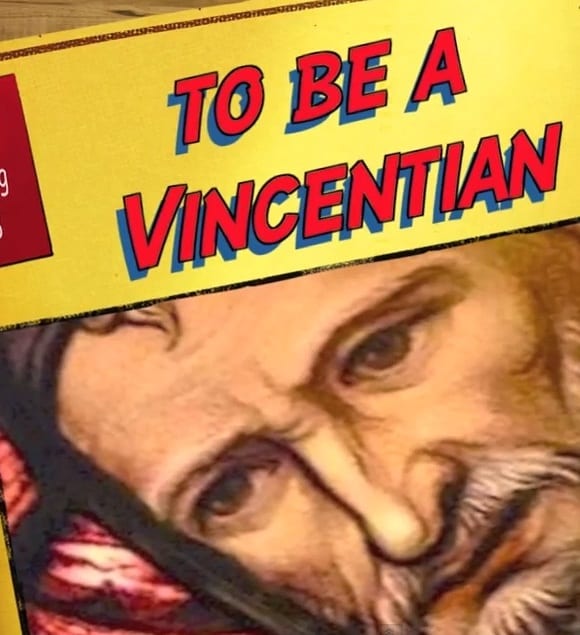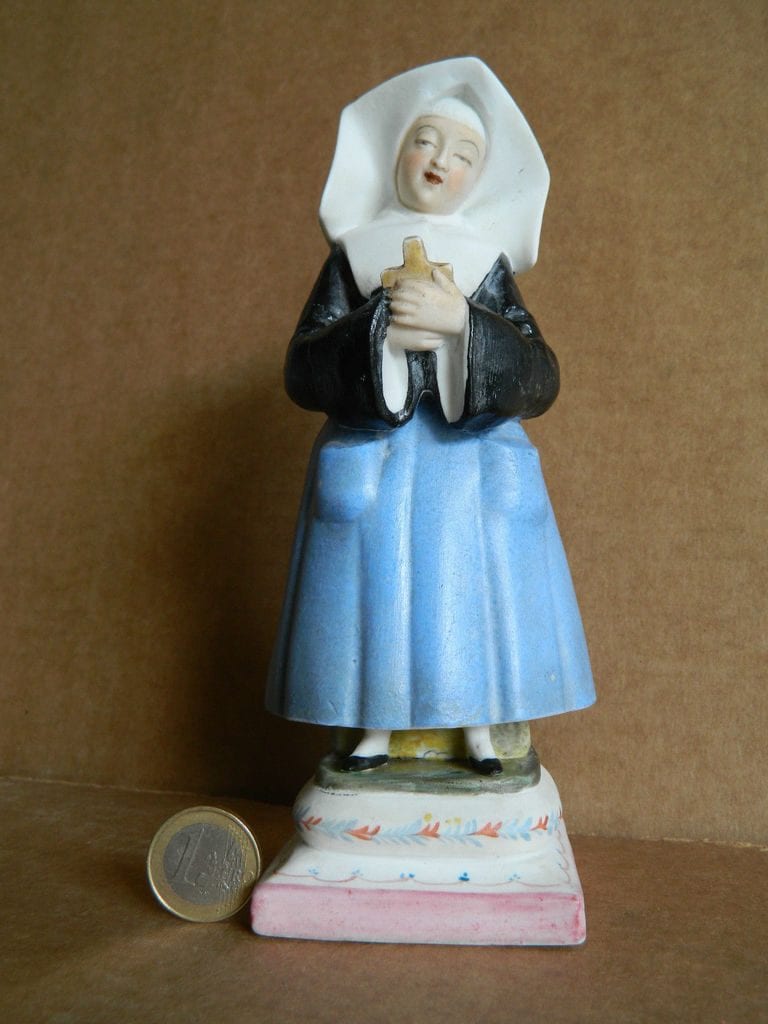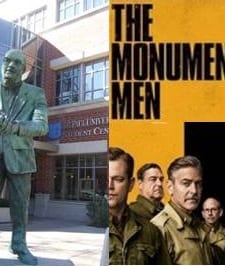A digital story produced in a workshop sponsored by DePaul University’s Office of Mission and Values. The workshop took place in July of 2014
Bill’s Digital Story
A digital story produced in a workshop sponsored by DePaul University’s Office of Mission and Values. The workshop took place in July of 2014
What is Vincentian?
Often at DePaul we hear, see, and use references to our institution’s Vincentian heritage and mission. The word “Vincentian” is a direct link to our patron St. Vincent de Paul and our founding religious community, the Congregation of the Mission (also called “Vincentians”). The DePaul community is quite serious about its Vincentian mission even if there are different and nuanced understandings of what it means in theory and practice. At times, praise is given to people for acting or making decisions in a “Vincentian” way, perhaps because they extended or distinguished themselves in service to others. In other instances, critical judgment is passed on some actions or policies for being “not very Vincentian,” or not reflecting our cherished mission and identity.
Because this Vincentian mission is central to our identity and purpose as an institution and to how we understand and go about our work the question “What is Vincentian?” is a particularly important and relevant one.
In one way, it is and should be an ever-evolving conversation as circumstances change. In another there are certain foundational elements to “Vincentian” that are consistent over time. In order to continue the conversation, I suggest two central ideas below for what “Vincentian” means. But, I’m interested in what others think. So – what do you understand to be key aspects of being Vincentian and to living out this Vincentian mission? What does it mean or ought it to mean for us to be a Vincentian university? What distinguishes us from other non-Vincentian institutions?
Attention to the Needs of Those Who Live in Poverty
“[G]o first to all the poor and help them; if you can do other things, fine!” St. Vincent de Paul (V.10, no. 86)
The first idea I would contribute to the conversation is this: to be Vincentian as a person or as an institution means that a constitutive dimension of who we are must be about alleviating the suffering and addressing the needs of those who live in poverty. If there is anything characteristic of Vincent de Paul’s theology and life’s work, it was an attention to “the poor.” Therefore, if there is anything characteristic of a Vincentian person or institution, it must include a self-understanding and a commitment to social responsibility, particularly to addressing the needs of those who suffer or are marginalized by our society. With this in mind, our lives or our success are not measured by self-advancement alone but ultimately by what we do to help others and the human community as a whole to advance, with particular attention given to people who are disadvantaged or underprivileged by the structural realities of our society.
Whether one is an accountant, a nurse, a journalist, a scientist, a computer programmer, a musician, a teacher, an actor — or whatever profession or discipline one pursues — to be Vincentian means that we understand that the resources, skills, talents and opportunities with which we have been blessed find their full expression only when they are invested not just for our own benefit but also for the good and well-being of others, particularly to alleviate the suffering of the poor and outcast.
Attention to Providence
“[W]isdom consists in following Providence step by step.” St. Vincent de Paul (V. 2, no. 720)
The second major component that I would contribute to any notion of what it means to be “Vincentian” is attention to what Vincent often called “Providence,” or to the movement and action of God in our daily life and experiences. Any reading of Vincent and his life reveals that Vincent’s worldview was grounded in a sense of God at work, leading him, guiding him, re-directing him, and moving him to action. Much of his attention was focused on discerning how and in what ways Providence was at work in his daily life, experiences, and human encounters. He understood himself and his followers in their day to day work to be part of a much larger mission and project, that of God’s mission on earth.
With this emphasis on paying attention to Providence , being “Vincentian” means that we understand ourselves to be part of a bigger movement that transcends and exceeds the limits of our own life and person. It begs in us the question: “What is the larger project or mission of which you and your daily life and work are a part?” Or, put another way, “To what end is your life and work directed?”
These are two elements that I believe are essential to any understanding of what it means to be a “Vincentian,” whether as an individual or as an institution. There are clearly others… what do you think? Share your thoughts and ideas so that we can together paint a fuller picture of what “Vincentian” means for us in today’s day and age and here at DePaul.
Mark Laboe serves as DePaul’s Associate Vice President for University Ministry
Photo courtesy of http://bit.ly/1pGWcyw
Rev. Jack Melito, C.M. passes away. Popular V.S.I. author
The Reverend Ignatius M. Melito, C.M., entered into eternal life on July 18, 2014 at St. Louis. He was 88 years old.
Fr. Jack, as he was affectionately called, was born in the city famous for Mardi Gras – New Orleans, on July 8, 1926 to Edna (Flynn) and August J. Melito. He grew up in our parish of St. Joseph in the heart of New Orleans and home to the largest church in the South, where he attended elementary school, staffed by the Daughters of Charity. He began his studies at St. Vincent’s College, Cape Girardeau, MO in 1938 and entered the novitiate on May 30, 1943. He took vows in the Congregation of the Mission on May 31, 1945. He completed his philosophy and theology at St. Mary’s of the Barrens, Perryville, MO and was ordained there on May 20, 1951.
Fr. Jack taught for one year, 1951-1952 at Los Angeles Preparatory Seminary, then the high school seminary for the Archdiocese of Los Angeles. After his brief time in California, he spent the remainder of his priestly ministry in Missouri and Denver, CO. His many assignments included St. Thomas Seminary, Denver, CO; St. Mary’s Seminary, Perryville, MO; St. Louis Preparatory Seminary South, Cardinal Glennon College, Kenrick-Glennon Seminary and St. Catherine Laboure Parish, all in St. Louis, MO. He also served as the Director of the Daughters of Charity of the then West Central Province from 1976 until 1985 and as one of the archivists for the then Midwest Province.
Fr. Jack loved literature and writing. He received his master’s degree in English from Catholic University of America, Washington, D.C., in 1953 and then his doctorate in English from the University of Denver in 1965. In addition to teaching English literature, he wrote or edited a number of articles and texts about the life of St. Vincent de Paul.
From 1989 until 1996 he was the editor of the then Midwest Province Newsletter. He continued to contribute to the Province’s Newsletter until his death. From 2003 until 2010 he was one of the proofreaders for a project of the translation of the letters and writings of St. Vincent de Paul. From 2003 until 2009 he also served as editor for the Servicette, the newsletter of the Ladies of Charity.
Because he was blessed with reasonably good health until his sudden death, Fr. Jack was able to keep active well beyond the normal retirement age. The beginning of the 21st century found him still involved in the life of the Vincentian Family in St. Louis, especially as spiritual advisor for the Society of St. Vincent de Paul. He was also an active, involved member of Lazarist Residence, his last community house.
The book of Proverbs mentions that “pleasing words are a honeycomb, sweet to the taste and healthful to the body.” The pleasing words of Fr. Jack, especially for those who read his bulletins and publications, made us more knowledgeable about our Vincentian heritage and helped us follow Christ more closely. May he rest in peace!
What George Clooney Taught Me About the Importance of Education
What does a mediocre rental movie have to do with existential questions of humanity and the value of higher education? Probably very little, but I will let you peek into the firing of my synapses which found a connection.
It was a free night with no plans so my wife and I rented a movie from the box in the drug store. After some discussion we choose The Monuments Men. The movie follows the ‘based on a true story’ tale of a group of art scholars tasked with preserving masterpieces during the throes of World War II. The mission is carried out while the Nazis are seeking to seize masterpieces from the countries being militarily conquered. Worse still, because of the war paintings, sculpture, and architecturally important buildings could be destroyed either due to the fighting and bombing or intentionally due to the Nazis’ desire to eradicate a people’s culture from the earth.
The movie focused on some key questions for us as people. How can we reconcile the spending of resources on preserving works of art (no matter how beautiful) with the fact that resources are in short supply and in high demand for other needs? How can we spend lives saving art rather than defeating the enemy? More importantly, what is it we are actually fighting for? What do we truly value?
These questions make me think of current debates regarding the value of higher education. What is higher education’s purpose or need when, in a changing job market, a college education is not necessarily required and is certainly not a guarantee of employment?
If higher education is reduced to being a hoop one needs to jump through to get a lucrative job, I will concede pursuing it may not make sense. It is however more than that. Though it may help one get a job (and well it should), higher education is about education — learning, imparting wisdom, and helping one discern vocation. Perhaps most importantly, higher education is about discovering the contributions a person will make with their one precious life.
The process of education is about making sense of life and our world; it is not so our job market can ask us what sense higher education makes. If education was all about how to get high-paying jobs (which are not bad and can be quite good) and that is all we focused on, our societal response to positions of care and compassion for our sick, elderly, and vulnerable would be very small. Human services would not be a field, nor would most liberal arts studies. History would be lost to time, and we would gain nothing from the accomplishments of those who have gone before us. The greatest accomplishments in thought and philosophy would go unlearned and unexamined. If it is all about high paying jobs, we may well be excellent producers of products, but we may never have learned how to think.
I recently watched the eyes of a large Mexican family – all of them, from oldest to youngest, men and women – fill with tears as they looked on with pride as their loved one (daughter, granddaughter, sister, niece, great niece, cousin) donned a DePaul cap and gown, becoming the first in their family to graduate from college. She will be going into a helping profession.
If higher ed is primarily about money this scene does not make sense, but if education is about more than that – striving to achieve, learning, living dreams, discovering passions, extending one’s understanding of community – the very things that make us human, then I think we have answered what the value of higher education is.
The movie The Monuments Men makes a compelling argument that we were not simply fighting to save people nor only to stop an imperialist power. We were fighting to preserve cultures, people’s histories, and greatest accomplishments. It makes the point that we value difference, beauty, and expression as humans. It also makes the point that we are willing to do what is necessary to preserve these elements for future generations. We do this so that those who come after us will be inspired to learn about their culture, learn about where they come from, and learn about the very essence of what makes them who they are.
Presumably this is also why we continue to offer and place value upon higher education. Without education present in our society we risk becoming a culture of task completers, valued chiefly by our capacity to produce. With learning present in our society, we are humanized and we are a culture of beings valued for who we are as a people.
In the movie one of the characters asks, “Who would make sure that the statue of David is still standing or the Mona Lisa is still smiling? Who will protect her?” If the focus had only been on defeating the Germans, the “monuments men” would not have made sense and neither would the art they were trying to save. If our focus is on our humanity and our greatest expression of such, these are the values we hold dear, these are the values we fight for, and these are the reasons we endeavor to learn.
Robert J. Gilmore is the Coordinator of Faith Formation for DePaul’s Catholic Campus Ministry
Monuments Men image from from wikipedia.org; Egan Statue from http://abt.cm/1nTAZDq
Purchase of the Week The Vincentiana Collection at DePaul University 7/13/2014
This week’s featured purchase from the Vincentiana Collection at DePaul University’s Archives and Special Collections is a late 19th century holy card depicting the death of Vincent de Paul. The surviving account of Vincent’s last days documented the fact that he died fully-clothed sitting upright in a chair. The account also recalls the presence of his confreres from Saint-Lazare at his passing.
5 Pieces of Advice for DePaul’s Incoming Freshmen— From Last Year’s Freshmen!
As the school year came to an end last month, I heard a lot of fellow freshmen saying things like, “I can’t believe how fast this year went!” Or, “I wish I could do (fill in the blank!) all over again.” A few of those freshmen were also talking about things they wish had known before they came to DePaul. So I gathered a group of these experts to offer their five top pieces of advice for DePaul’s incoming class. Here we go:
DON’T BELIEVE WHAT YOU SEE ON TV!
You’re probably not going to be partying all the time. In fact, if you try this, you’re likely going to watch your grades plummet. You’ll be out of here faster than you can say “This party rocks”. On the other hand, most college experiences aren’t spent under a tower of books either. Most students are able to balance their academics with their social life. But make some good choices because your first few quarter grades will really shape your overall GPA down the road.
MAKING FRIENDS IS TIME CONSUMING AND CAN BE DIFFICULT
The first week, particularly if you’re part of the Discover program, your whole floor tries to be best friends. This likely won’t last. Depending on your res hall, you will stay social, but most of your friends will come from elsewhere. Classes are small, which is great for individualized attention from teachers, but this does not actually help that much in making friends. Aside from group projects, you most likely won’t talk to your classmates much. Your friends will come from the communities you get involved in. There are tons of different clubs, sororities, fraternities, faith-based groups, and service groups. The more you get involved, the more people you meet and the less lonely the campus feels. And sometimes joining a group that just sounds interesting cannot only turn out to bring you great friends, but you might discover some new interest or passion.
YOU HAVE A LOT OF TIME – YET NONE AT ALL
Coming from high school means that most of you probably were really busy with classwork, extra-curricular things and trying to hang out with your friends before you all went your separate ways. That final year in high school is really busy with fourteen hour days being packed full. When you get to DePaul you will find that your time is really open. You’ll be wondering how to fill the hours and you might even miss the structure and business of high school. But don’t panic. Your schedule will get packed. You’ll need to make time for classes, studying, working, social life and the groups you join. Don’t forget to add in time to go out of your building for meals and try to work in some recreation. You’ll need time to work out the stress and tension. And then, before you know it, your calendar is packed and you’re back to fourteen hour days. So be particular about what you fill your hours with. Join clubs, go out, leave time to study, and maybe, just maybe, try to squeeze in some time for sleep…and set and stick to priorities.
BEING A COMMUTER CAN BE BRUTAL
While you may not have to deal with annoying roommates and awful meal plans, being a commuter is tough. It’s harder to meet people when you’re not on campus as often. While no one really likes traffic or trains, commuters inevitably come to loathe these things, though they are experts on navigating them. The truth is, though, everyone at DePaul becomes a commuter eventually because few people live on or even near campus after freshman year. Find friends to live with off campus, find friends who commute like you, find friends who can share the grind of commuting and enjoy your time at DePaul whether in the res halls or not!
THIS IS CHIBERIA
This past winter was particularly cold, but those from warmer states or maybe even those just not used to feeling lake-effect winds may not be prepared for winters in Chicago. Get yourself some waterproof boots, a real winter coat, a thick scarf, thicker gloves, a fuzzy hat (no matter how goofy you look!), grow some of that tough Chicago skin, and start praying for spring. The quarter system lets us skip the December snow, but as you’re waiting at the Fullerton platform the first week of January and shivering, you’ll realize that we got back just in time for two or three months of ice. Someone waiting with a bunch of people on the Fullerton platform said to one shivering group, “You live in Chicago? You’re a warrior. You know that? A WARRIOR!” Yes, yes, we are warriors. And the battle starts winter quarter.
WELCOME TO DEPAUL, freshmen! You are in for a great year…and it will fly by…and then YOU can share your advice with the next new class. Enjoy!
Lindsey Echito is now a sophomore at DePaul who put her advice together with other freshmen thoughts to offer this great advice.
Photo courtesy of DePaul DeBlogs
Writing a Global History of the Daughters of Charity
On Wednesday, May 21, 2014 Matthieu Brejon de Lavergnée presented a lecture on the History of the Daughters of Charity. This was recorded on site at the Richardson Library.
A Spiritual Life…
“Spiritual but not religious” is how many people identify themselves. I hesitate to label myself this way as I begin to uncover the truth, or lack thereof, in my own religious upbringing. Those who identify as such catch some flak for it, I think, because we don’t commit to a particular community. We don’t gather to celebrate our spirituality in a church, synagogue, temple or mosque. So what does our spirituality look like? Is it “watered down,” unfounded or ungrounded? I hope not.
I once heard that it is unacceptable to be a “cafeteria Catholic,” choosing various parts of the faith that one liked and discarding the parts that one doesn’t like. I found I had done that. I like the parts of Catholicism about preferential option for the poor, serving others and walking with people in their brokenness. But I didn’t like the hierarchy, patriarchy or history.
So now I see the spiritual life as “outside.” That “outside” is both literal and figurative. For me it is a journey outside of myself, outside into nature and outside of the comforts and norms to which we acquiesce. Maybe it’s a focus on what science explains to be so amazing: redwoods that have stood for thousands of years, the physics of lift for a flying bird, the euphony of rain. It’s outside of buildings but also outside of one’s self. Spirituality seems to require the first step of listening – listening to others whether they are 7 years old, 47 years old or 97 years old, the President of the company or the janitor of the facility. It also requires listening to every moment; listening to the water drip in the shower, your shoes hitting the pavement, wind in the trees, air as it circulates a room, the breath of the person next to you and the laughter of a stranger.
There is a spirit that runs through and connects all those things. Maybe to get in touch with one’s spiritual self is to just stop, go “outside” and listen; but truly listen. So often we try to think of a best response to someone that we don’t actually listen to them. So often we try to think of a best response to a situation that we don’t listen to that situation. Before the planning and action, why not listen? When an upsetting situation or event arises I try to come up with a solution immediately. Maybe I just need to listen to the situation before attacking, as if it needs quelling. When a good or positive situation arises I try to think about how I can keep it going and preserve the good. Maybe I should just listen to it and let it go.
There is the spirit that gives people, animals and plants life. There must be a spirit that gives each moment and social movement life. When a community gathers to support equal rights, when a community stands up against injustice, when a community collaborates to bring about social change, it invokes a spirit. How do we nourish that spirit? How do we give spirit to the spiritual life?
Emily Kraus is an Administrative Assistant with the Division of Student Affairs who is also pursuing her Masters degree in Bilingual Bicultural Education at DePaul’s College of Education. She is a former University Ministry student leader who completed her DePaul undergraduate degree in 2006 .





